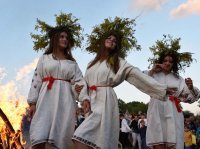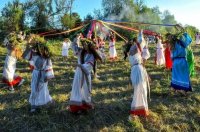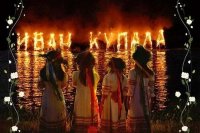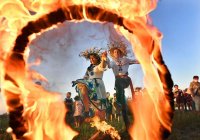 The Feast of St. Ivan Kupala has been celebrated in a merry and grand way for centuries. It is associated with many customs and traditions, many of which will be respected in 2023. One of the most famous folk festivals is the Day of Ivan Kupala. Its history goes back into the past - so it is surprising that its traditions have survived to this day. Many celebrate Ivan Kupala in 2023 according to the traditions of our ancestors. On this day, someone certainly goes to the lake to bathe, someone makes a fire, and someone meets midnight looking for the flowers of the fern. The Feast of Ivan Kupala in 2023 falls on July 7, as always. However, the celebration begins the night before, in the evening of July 6, just after sunset. The festivities continue all night long: people party until dawn.
The Feast of St. Ivan Kupala has been celebrated in a merry and grand way for centuries. It is associated with many customs and traditions, many of which will be respected in 2023. One of the most famous folk festivals is the Day of Ivan Kupala. Its history goes back into the past - so it is surprising that its traditions have survived to this day. Many celebrate Ivan Kupala in 2023 according to the traditions of our ancestors. On this day, someone certainly goes to the lake to bathe, someone makes a fire, and someone meets midnight looking for the flowers of the fern. The Feast of Ivan Kupala in 2023 falls on July 7, as always. However, the celebration begins the night before, in the evening of July 6, just after sunset. The festivities continue all night long: people party until dawn.
But why exactly this night was considered so special? After all, our ancestors were sure that at this dark time fairies, mermaids, water, houses and other unclean go "hunting", water and fire acquire magical power, and somewhere in the world fern blooms. The fact is that previously the night of Ivan Kupala really differed from all the other nights, as it was the shortest of the year (originally, the holiday was celebrated on the summer solstice - June 21). Then the date of celebration was shifted several times: with the advent of Christianity the holiday was combined with the birthday of Ioan the Baptist (June 24), and after the transition to the  Gregorian calendar June 24 was moved to July 7.
Gregorian calendar June 24 was moved to July 7.
Ivan Kupala is considered a pagan holiday. And not accidentally - even among idolaters on the day of the summer solstice it was customary to perform rituals of purification and ablution. It was believed that having a bath on this day, you can get rid of illnesses.
Some believe that the name "Kupala" is associated with these rituals. Others believe that the holiday got its name because it was dedicated to a certain Kupala, "the god of wild flowers and fruits.
But then where did "Ivan" come from? It appeared just after the baptism of Russia. After the adoption of Christianity, they tried to eradicate all pagan traditions at all costs. And in the end they decided to simply replace the feast of Kupala with the feast of the Birth of Ioan (Ivan) the Baptist - the prophet who predicted the coming of the Messiah and baptized the Savior in the Jordan River. However, we failed to make people forget the ancient rituals, but we managed to change the name: people "merged" the pagan and Christian holidays into one - the day of Ivan Kupala.
There is an opinion that the name of the holiday is associated exclusively with Ioan the Baptist, because in Greek his name means "the Bather.
However, the day of Ioan the Baptist continues to be celebrated to this day. And do it cheerfully and in a big way. By the way, the holiday is popular almost all over Europe (although in each country it is called differently).
Since our ancestors believed that on the night of Kupala water, fire, flowers and herbs acquire magical properties - are able to clear sins and cure of all diseases - then most of the rituals and traditions were associated with them.
 For example, the holiday was unimaginable without a bonfire as well as jumping over it. And jumping through the fire was most liked by young people: it is an occasion to show their courage. In addition, our ancestors were convinced that such a jump can cure illnesses and the evil eye, and at the same time make the person who did it happier and luckier. Girls also loved this fun: they believed that it could make them prettier and more attractive. But this activity was always especially popular with lovers: it was believed that if a young couple held hands and jumped over the fire as if nothing had happened, they would be inseparable.
For example, the holiday was unimaginable without a bonfire as well as jumping over it. And jumping through the fire was most liked by young people: it is an occasion to show their courage. In addition, our ancestors were convinced that such a jump can cure illnesses and the evil eye, and at the same time make the person who did it happier and luckier. Girls also loved this fun: they believed that it could make them prettier and more attractive. But this activity was always especially popular with lovers: it was believed that if a young couple held hands and jumped over the fire as if nothing had happened, they would be inseparable.
Another mandatory item of the holiday program has always been mass bathing. The magical properties attributed to water were not the only reason for our ancestors to take a dip in the nearest lake: it was believed that on the shortest night of the year, the devils would leave all the lakes and rivers.
By the way, on the day of St. Ivan's Eve, absolutely all water was considered magic. Even dew. Our ancestors washed with it: women - to preserve their youth and attractiveness, men - in the hope to become stronger and more enduring.
As for wildflowers and herbs, which also acquired magical power on St. Ioans night, almost all women used to go on that very night to gather them. From the gathered plants usually wreathed wreaths, made bouquets or amulets to protect against evil spirits, and also dried them to use when the need arose - for example, when you need to heal someone or attract good luck.
 However, one flower was especially popular on St. Ivan's Eve. It is the fabulous fern flower. If we believe the legend, the fern blooms only on the shortest night of the year, or rather it opens for one moment at midnight. Everyone wanted to find this mystical flower. The legend says that the one who finds it will find treasures and fulfillment of all desires.
However, one flower was especially popular on St. Ivan's Eve. It is the fabulous fern flower. If we believe the legend, the fern blooms only on the shortest night of the year, or rather it opens for one moment at midnight. Everyone wanted to find this mystical flower. The legend says that the one who finds it will find treasures and fulfillment of all desires.
Weaving wreaths on the feast of St. Ioans Eve was for a reason. Girls not only decorated their hair with them, but also used them for fortune-telling. They lowered their flowery headdresses with lighted splinters into the nearest river and watched their behavior closely. If a wreath sailed farthest away, its owner would be the happiest; the longest burning splinter promised a long life. But a drowned wreath was a cause for sadness, because it meant that one could not even dream of a wedding in the coming year.


